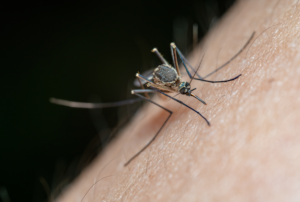Stop the Bite, Start the Fight

At the first sign of mosquito bites, it is common for people to run to Walmart for repellent. A few sprays later and the problem is over, right? This mentality has led droves of North Carolinians to stock up on mosquito spray, more than ever before. Globally, sales of mosquito repellent have grown consistently for many years. While this in itself may be seen as a problem it promotes the creation and distribution of harmful chemicals, it is actually the result of a larger issue: the growth of mosquito season.
In 2021, Raleigh and Durham NC were listed as two of the top ten worst cities for mosquitoes. Mosquitoes typically thrive in areas where the temperature at nighttime is over 68 degrees Fahrenheit. When global temperatures rise, so does the mosquito population. This is evident in North Carolina especially, where mosquito season has grown from 114 days on average to 147 days on average. This increase presents health risks including skin rashes, viruses, and parasites, which can spread even without mosquito bites. Rates of the West Nile Virus have grown consistently in North Carolina, and this disease is most commonly spread by mosquitoes.
This increase in mosquitoes in North Carolina is a prime example of the dangers posed by extreme climate change. By continuing to contribute to environmental destruction through the promotion of unsustainable energy and a lack of cohesive policy, North Carolina is positioning itself to be in an even worse position than it is currently. It is only by mitigating inaction and apathy that we can change our trajectory and become environmentally sustainable. North Carolina, as the home to 10.4 million people, can become either a great help or a great hindrance to environmentalism, since its large population allows it to have a great impact.
The issue of climate change affects us all, and thus it is our responsibility to take action. Through a plethora of avenues including lobbying, informing, and advocating, anyone can make a difference and improve our climate. Perhaps the most accessible of these avenues is that of contacting legislators. Below, I have shared a template email for initial contact with a representative. This email can be expanded upon as necessary.
Hello [REPRESENTATIVE]
My name is [NAME], and I’m a resident of [PLACE OF RESIDENCE]. I was hoping you could give me some information on your stance on climate change. Environmental advocacy is an important issue to me, so I was wondering what specific policies and actions you’ll be promoting in order to boost environmentalism in [PLACE OF RESIDENCE]. If there is anything I can do to help with this effort, please let me know.
Thanks,
[NAME]
The emails of legislators or their offices are found online, making them accessible to everyone with Internet access. This accessibility is what makes these emails one of the most effective methods for taking action against climate change. When environmentalism is a pressing issue by a legislator’s constituents, it becomes relevant to their platform, since it has become known that people are paying attention. Because of this, it is vital that we all do what we can to make it known that we care. We are paying attention, letting nothing get swept under the rug.
In North Carolina and beyond, we are at risk of climate change’s consequences. By coming together as a community at every level, local, state, and national, we can influence the policies that dictate how our country addresses the environment. Even through small acts, we can all positively impact the environment in our communities.
Author: Gabriella Greer
Author Description: Gabriella Greer is a current senior at Marvin Ridge High School who plans to study international relations and environmental science during her post-secondary education. As an ecoAmerica Climate Ambassador, Gabby works to promote environmental awareness among the young people in her community through digital and personal organizing.
